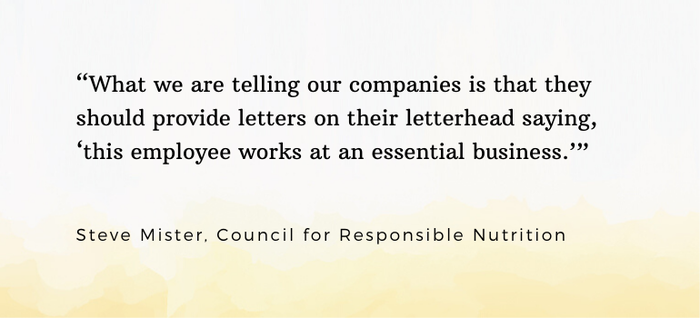
As the calendar turns from March to April, three out of five Americans are under some kind of lockdown. Bars are closed. You can’t get your hair cut. Restaurants are serving curbside takeout, and even COVID-19 testing is a drive-through affair. But while Americans are seeing dietary supplements as part of the answer, government might be asking whether their manufacture is “essential.”
The question will likely be answered jurisdiction by jurisdiction, but there is a possibility that supplement manufacturing and distribution centers could be shut down. Already, workers on their way to supplement companies in lockdown districts were being stopped by law enforcement and asked to justify why they were not following shelter-in-place regulations. Council for Responsible Nutrition President Steve Mister says the organization is offering guidance while lobbying state governments for clarity.
Takeaway: A lack of consistent lockdown policies are challenging the industry as trade associations lobby to keep supplement facilities classified as "essential business."
“What we are telling our companies is that they should provide letters on their letterhead saying, ‘this employee works at an essential business,’ so the employee would have that on them,” Mister says.
The challenge could become whether a business can declare itself “essential.” CRN has signed onto a letter to U.S. governors explaining why the supplement industry is a crucial resource during the crisis. The letter is a joint communication from United Natural Products Alliance, the American Herbal Products Association and the Consumer Healthcare Products Association. The letter argues that dietary supplements should fall under Centers for Disease Control guidelines declaring “health care services and pharmaceutical and food supply” as essential. “Now more than ever, consumers need to access dietary supplements to assure they receive proper nutrition, maintain their immune health, receive proper sleep, promote bone and heart health, and proactively reduce their risk of certain chronic diseases without burdening an already overstretched healthcare system,” the letter reads.
It’s a strong argument, Mister say, and a mission top of mind for trade associations during this stage of the pandemic. “Our number one objective this week is to keep our companies open so they can continue to make product for customers,” Mister says.

At the channel end of the equation, the American Herbal Products Association reports it has “been informed that the state of Pennsylvania and some individual cities, including San Francisco and Miami, have asked some health food stores, specifically those that sell only dietary supplements and little or no conventional foods, to close.”
NOW Foods CEO Jim Emme says he is watching the situation closely. The company has Nevada operations and its facilities qualified as essential in the first round, but he can’t be sure that will hold true as the situation evolves.
From Emme’s point of view, dietary supplements have never been more “essential.”
“This is our opportunity to shine and support our mission of helping people,” he says, “helping them be well, helping them live a healthier lifestyle.”
Pandemic Potential Part 6
<< Go back to Safety article | Go to next article: Claims Questions >>
About the Author(s)
You May Also Like





